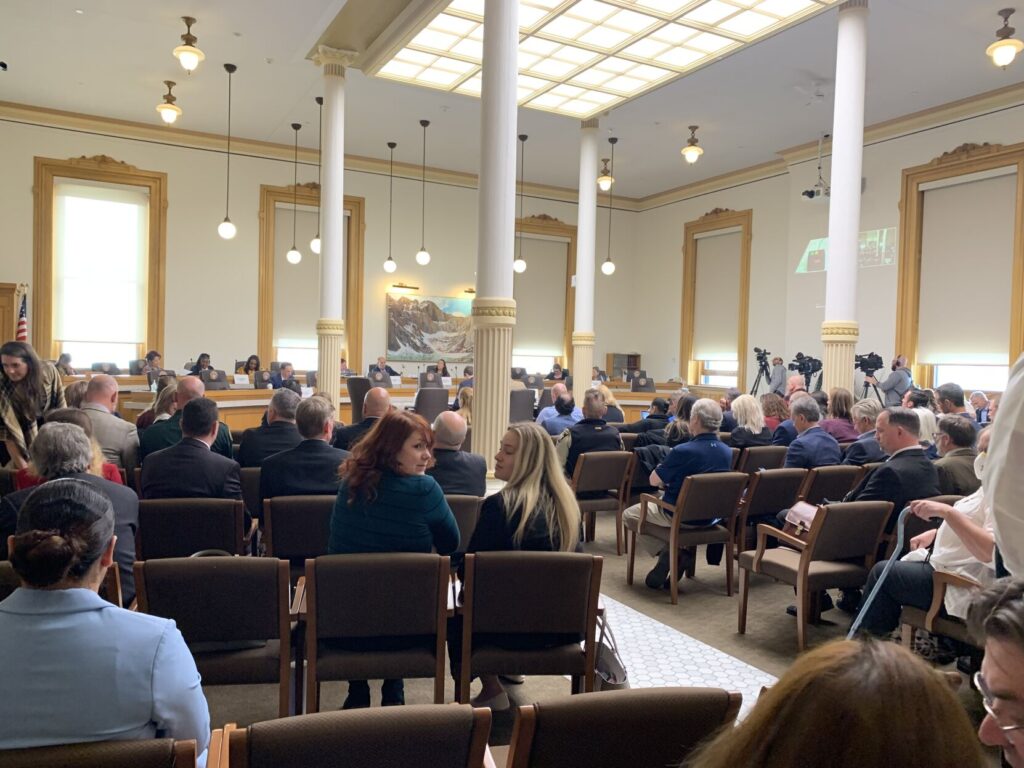Payback? Democrats gut, then reject party mate’s proposal on county commissioners

A Democrat on Friday saw his proposal dealing with the number of county commissioners first effectively gutted by an amendment and then killed by his party mates, a rare sight that might have its genesis in the legislator’s lawsuit over the caucuses’ practice of meeting away from the public view.
That lawsuit outlined a secretive process by which Republicans and Democrats met to discuss legislation or discussed policies via messaging apps effectively outside of the purview of the state’s Open Meetings Law.
The lawsuit ultimately led to a settlement.
Was it payback?
“There may be some truth to that,” said Rep. Bob Marshall, D-Highlands Ranch.
Marshall had sponsored a measure that would have required counties with populations of 70,000 or more to have five county commissioners, with at least three elected by voters of the candidate’s district.
Current law allows, but not mandates, five-member county commissions. Expanding to five commissioners is an option open for voters.
There are four counties that have five commissioners: Adams, Arapahoe, El Paso and Weld.
House Bill 1177 won a bipartisan vote from the House State, Civic, Veterans and Military Affairs Committee on Feb. 26.
In committee, the vote against the bill included two Democrats.
Several counties that would be affected by the measure also opposed the bill, notably Larimer and Pueblo.
After the committee hearing, Marshall was ready to see the bill through its second reading debate on the House floor.
It didn’t turn out the way he expected.
Marshall, sensing dissension in the ranks, offered an amendment to change the population requirement to 250,000, which would affect only the top nine counties, instead of the top 12.
And given that four of those nine counties already have five-member commissions, the bill would only effectively apply to Boulder, Douglas, Jefferson and Larimer counties. Denver, since it is a city and county, does not have a county commission, only a city council.
Instead of adopting his amendment, Marshall’s fellow Democrats pushed what’s called a “strike-below” amendment that rewrote the entire bill.
The amendment removed everything about requiring counties to have five commissioners and changed it to merely being about the petition process — that is, should voters decide they want five commissioners. Under current law, voters already have the option to increase the number of commissioners to five.
Rep. Andrew Boesenecker, D-Fort Collins, who offered the amendment, told Colorado Politics it is based on the opposition from Larimer County, where he resides.
Marshall was fully aware it was coming, Boesenecker said.
Marshall seemed taken aback by the vote to approve the amendment. He called the rewrite “disappointing” and “inappropriate,” though he also described it as a “very slight” improvement.
He thanked Boesenecker for not killing the measure outright.
It was a portend of things to come.
When it was time for the second reading vote, which is typically a simple, vocal “yes” or “no” affair, Republicans asked for a division vote, meaning the nonpartisan staff would count who stand in favor or against it.
It’s not a recorded vote and even the numbers for those standing on either side aren’t announced.
The bill died on that division vote. Two later efforts by Rep. Elisabeth Epps, D-Denver, to resuscitate the bill also failed, the first on a 23-34 vote and the second on a 27-30 vote. Marshall’s support for the measure came largely from the progressive wing of the caucus.
That’s not something that happens often to a Democratic bill, particularly in a House where Democrats hold a supermajority of 46 members to the Republicans’ 19.
But there may have been more at play than just the vote itself, Colorado Politics learned from multiple sources, and Friday’s action may have been a bit of payback.
Marshall, along with Epps, had sued their own caucus — as well as the GOP caucus — over conducting public business outside of the public eye through the use of secret messaging apps, such as WhatsApp, and holding caucus meetings without notice or minutes, as required by the state’s Open Meetings law.
That lawsuit resulted in a settlement last summer, in which all parties agreed to follow the rules. Notices for House caucus meetings are now posted on the General Assembly website. Minutes, however, are only posted infrequently, if at all. The Democratic caucus maintains a separate website with updated minutes.
Epps and Marshall were both removed from the House Judiciary Committee prior to the start of the session at the behest of House Speaker Julie McCluskie, who noted the ruckus that took place on the committee during the 2023 session. That incident occurred primarily between Epps and Rep. Mike Weissman of Aurora, the committee’s chair, and that conflict continued into the November special session.
Marshall, the first Democrat to represent Douglas County in recent memory, won his 2022 race by 405 votes, just outside the automatic recount margin. He is running unopposed in the June primary, while two Republicans have filed to run against him in November.
Editor’s note: a previous version linked to the General Assembly website for minutes for House Democrats’ caucus meetings. It has not been updated in a month, although House Democrats maintain a separate website for caucus minutes.













